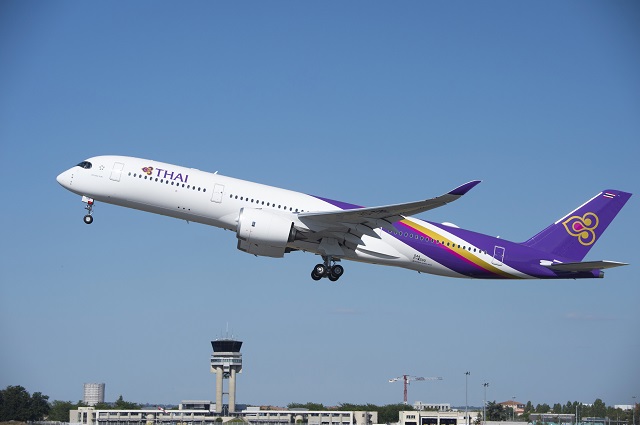THAI Airways Aims for Sustainable Long-term Fleet Growth to Enhance Bangkok as Aviation Hub

Thai Airways International Public Company Limited (THAI) recently entered into an agreement with the Boeing Company and GE Aerospace in acquiring mid-range and long range wide-body aircraft and engines; consisting of a firm order of 45 aircraft, along with options for additional aircraft to be incorporated into the THAI fleet, with deliveries starting from 2027, under the ten-year timeframe of 2024-2033 according to THAI’s route network plan.
In 2023, THAI issued the Requests for Proposal (RFP) to aircraft and engine manufacturers (OEMs) in accordance with its route network plan and long-term fleet strategy in order to consistently generate revenue, aligning with its financial projections and targets.
The long-term aircraft acquisition plan is crucial for replacing gradually expiring leased and aging aircraft. It is quintessential for sustaining growth and retaining market share. THAI’s market share has drastically decreased especially at its Bangkok hub, Suvarnabhumi Airport from 51.3% in 2013 to 27% in 2023. This decrease is partly due to the limitations of THAI’s fleet size and aircraft efficiency over the past decade.
The THAI fleet consisted of 100 aircraft in 2013. The Company decommissioned and discontinued the lease of aging and less-fuel efficient aircraft during its Rehabilitation process after the COVID-19 outbreak to decrease maintenance and operating costs. In addition, deteriorating cabin equipment and maintenance costs have become a severe burden for the company. The decommission of aircraft resulted in 64 operating aircraft at the end of 2022, a 36 percent decrease compared to 2013.
In response to the market’s rapid recovery and increasing travel demands, THAI bolstered its fleet by acquiring additional aircraft through operating leases in 2022–2023. From Q2/2023 onwards, THAI secured 21 additional wide-body aircraft, primarily Airbus A350s equipped with Rolls-Royce Trent XWB engines. Additionally, THAI plans to introduce Airbus A321neo aircraft into its fleet starting in Q4/2025. This growth strategy aims to accommodate increasing demands and enhance service quality. THAI fleet consists of 70 aircraft in 2023, increasing to 79 in 2024 and is projected to 90 aircraft by 2025.
Considering the number of aircraft scheduled for decommission and lease expiry, the aircraft order backlog, aircraft production capability, and the significantly increasing demand of aircraft in the aviation industry, THAI’s fleet, without this long-term aircraft acquisition, would decrease to only 51 aircraft in 2033, a 49% decrease from its 2013 size. This would not generate the revenue needed to repay debts to its creditors. However, with the acquisition of 45 aircraft, THAI’s fleet would reach 96 aircraft, which is still less than in 2013.
Regarding the financial strategy for financing the acquisition of aircraft and engines, THAI’s current financial health and projected liquidity are adequate to support the procurement within the aforementioned timeframe. THAI will carefully evaluate the source of funds and select the most appropriate financing method based on liquidity, market dynamics and financial viability. THAI remains open to considering various funding models including operating and financial lease, aiming to strike a balance that optimizes financial flexibility and operational efficiency. This acquisition will not affect the ability to repay debts to the creditors.
Through meticulous research and a transparent RFP process, THAI negotiated directly with the aircraft and engine manufacturers, adhering to the industry standard practices adopted by other leading international airlines. In collaboration with independent external accredited advisors, THAI has developed the potential future route network and financial model, proposal evaluation and negotiation with OEMs prioritizing the company’s best interests. Key considerations include ownership costs, rentals, maintenance expenses, fuel consumption, and engine reliability, all while prioritizing revenue efficiency metrics like production volume and earnings capability in alignment with the financial estimates outlined in the Rehabilitation Plan. Additionally, THAI has carefully evaluated enhancing customer experiences and satisfaction through factors such as comfort, seat allocation, and cabin facilities, ensuring THAI’s strategic decisions are both financially sound and operationally effective.
THAI and the manufacturers will announce further details of this aircraft acquisition including aircraft type and engine specification at the Singapore Airshow, held during 20 – 25 February 2024.
THAI continues to strengthen partnership with leading aircraft and engine manufacturers to enhance fleet efficiency and to ensure superior customer experience through all of their flight journey. THAI affirms that the objective of this long-term aircraft acquisition is financial viability, conducted with integrity and transparency. THAI’s priority is to continue to proceed with its recent commercial success, maximizing profitability to achieve the objectives of the Rehabilitation Plan, fostering sustainable growth. This will allow THAI to realize its vision of being a premier world-class carrier and further strengthening Bangkok as one of the leading global aviation hubs.
